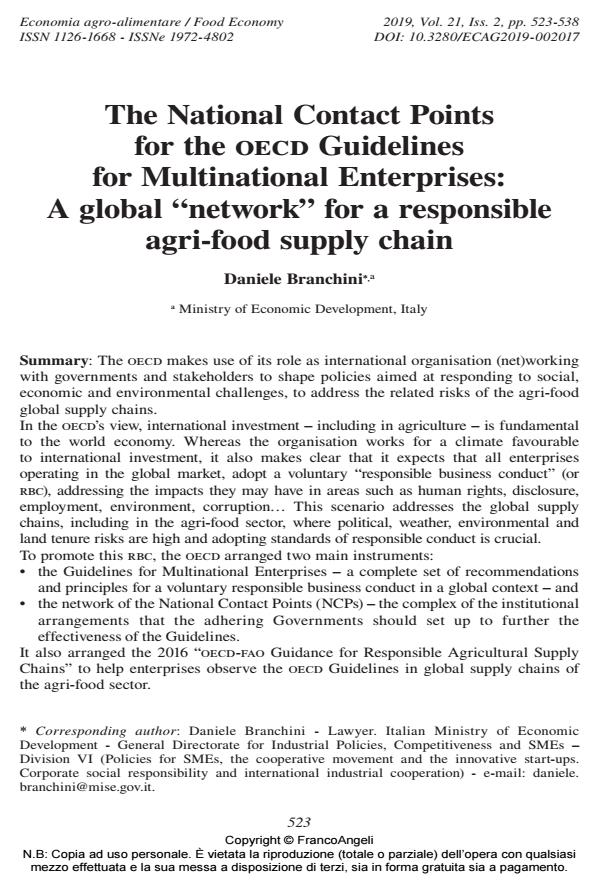The National Contact Points for the oecd Guidelines for Multinational Enterprises: A global "network" for a responsible agri-food supply chain
Titolo Rivista ECONOMIA AGRO-ALIMENTARE
Autori/Curatori Daniele Branchini
Anno di pubblicazione 2019 Fascicolo 2019/2
Lingua Inglese Numero pagine 16 P. 523-538 Dimensione file 143 KB
DOI 10.3280/ECAG2019-002017
Il DOI è il codice a barre della proprietà intellettuale: per saperne di più
clicca qui
Qui sotto puoi vedere in anteprima la prima pagina di questo articolo.
Se questo articolo ti interessa, lo puoi acquistare (e scaricare in formato pdf) seguendo le facili indicazioni per acquistare il download credit. Acquista Download Credits per scaricare questo Articolo in formato PDF

FrancoAngeli è membro della Publishers International Linking Association, Inc (PILA), associazione indipendente e non profit per facilitare (attraverso i servizi tecnologici implementati da CrossRef.org) l’accesso degli studiosi ai contenuti digitali nelle pubblicazioni professionali e scientifiche.
The oecd makes use of its role as international organisation (net)working with governments and stakeholders to shape policies aimed at responding to social, economic and environmental challenges, to address the related risks of the agri-food global supply chains. In the oecd’s view, international investment - including in agriculture - is fundamental to the world economy. Whereas the organisation works for a climate favourable to international investment, it also makes clear that it expects that all enterprises operating in the global market, adopt a voluntary "responsible business conduct" (or rbc), addressing the impacts they may have in areas such as human rights, disclosure, employment, environment, corruption" This scenario addresses the global supply chains, including in the agri-food sector, where political, weather, environmental and land tenure risks are high and adopting standards of responsible conduct is crucial. To promote this rbc, the oecd arranged two main instruments: " the Guidelines for Multinational Enterprises - a complete set of recommendations and principles for a voluntary responsible business conduct in a global context - and - the network of the National Contact Points (NCPs) - the complex of the institutional arrangements that the adhering Governments should set up to further the effectiveness of the Guidelines. It also arranged the 2016 "oecd-fao Guidance for Responsible Agricultural Supply Chains" to help enterprises observe the oecd Guidelines in global supply chains of the agri-food sector. This note will focus on the innovative character of this system; on the NCPs’ task to implement and "enforce" the oecd Guidelines (a soft law instrument), and on the ways the international NCPs’ network can contribute to a responsible management of the agri-food supply chains. It will highlight the importance of the cooperation among NCPs, enterprises, governments, worker organisations and NGOs to encourage the widest adoption of the oecd Guidelines. In particular, it will focus on the need for the NCPs of the different countries to co-operate, in search of a common understanding on common issues. Cooperation will be also presented as crucial for managing the non- judicial grievance mechanism entrusted to the NCPs to find a consensual settlement of disputes, arising from the alleged breach of the Guidelines, between one or more stakeholder(s) and one or more enterprise(s), also in the agri-food sector.
Parole chiave:Oecd Guidelines; National Contact Points; Responsible business conduct; due diligence; global supply chains.
Jel codes:Q01, Q10, Q18
Daniele Branchini, The National Contact Points for the oecd Guidelines for Multinational Enterprises: A global "network" for a responsible agri-food supply chain in "ECONOMIA AGRO-ALIMENTARE" 2/2019, pp 523-538, DOI: 10.3280/ECAG2019-002017